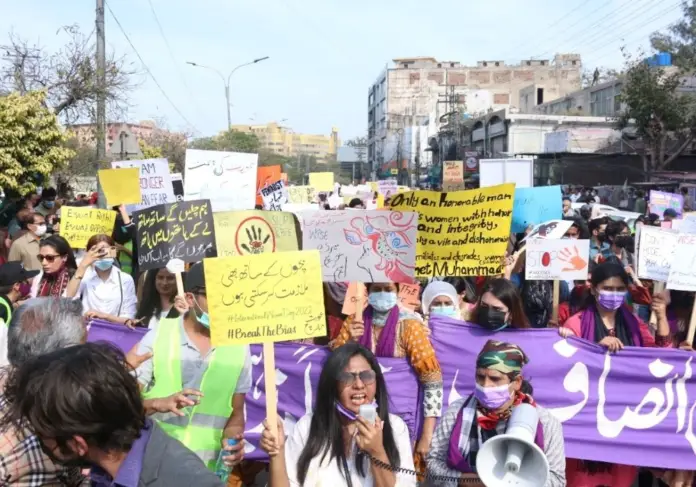On March 8th, people all over the world take time to celebrate the advancements made for women and celebrate their accomplishments. It is a day set aside to honor the bravery and tenacity displayed by women who have made outstanding contributions to their communities, nations, and families.
No matter what ethnicity, gender, or country you are from, everyone has a right to basic human rights, yet occasionally states turn into banana republics where the only applicable law is “might is right”. We can’t use Pakistan as an example, but many women are denied basic rights for which they should struggle and demonstrate.
On March 8th Pakistanis also appreciate women’s contributions and organize various ceremonies to honor womanhood. But, because feminism is the most divisive idea in the world, this holiday becomes contentious every year. Till now, Aurat March is the second-most contentious event in Pakistan after politics. So let’s see what makes this concept a big deal.
The first marches occurred in Lahore, Karachi, and Islamabad, in 2018 in what appeared to be a synchronized explosion of radical protest throughout the three major Pakistani city centers. Before that, women’s day in Pakistan was a quiet, little NGO-observed holiday on which development experts spoke to members of the then-in-power government about the SDGs and alarming statistics.
This changed in 2018 when three Aurat March chapters, each in a separate city, declared their respective Aurat Marches. These chapters claimed to be non-hierarchical and self-funded. There was a flood of radical feminist digital art and hashtags, ferocious discussion and declarations, and street art murals, posters, and solidarity building were used during the mobilization that is where the controversy of slogans emerged.
People’s reactions to the Aurat March Slogans were generally ambivalent. Some people think these slogans were appropriate yet sarcastic, while others think they devalue the place of women in society. Some of the slogans were even mocking the other segments of society. Slogans like “Mera Jism Meri Marzi,” “Duppta itna pasand hy tu ankhon py ouro,” “Khana kud garam kro,” “Lo beth gai theek sae” received a lot of hate while slogans like, “Man of quality believes in equality,” “Vocal hon batmez nhi,” “Freedom over fear,” “Taleem aurat ka behtreen zewar,” “Nam sirf beta nhi beti be bna skti hy,” got a lot of appreciation as well. Here is where the query appears. Where does this whole thing become problematic? And why do people start hating instead of Supporting?
To find the answer to these questions we must first determine if the message of feminism and the Aurat March is being propagated properly and decently through these marches and slogans. Feminism is a celebration of womanhood, but sadly, many liberal feminists undermine the entire idea by deviating from its intended meaning. The goal of these marches is to spread the message of loving women throughout the world, but instead, the movement devolves into a pseudo-feminist one, which undermines its entire purpose of it.
Pseudo-feminists frequently lash out and degrade men to address all the injustices done to women. What they overlook is justice, which is the cornerstone of the feminist movement. Pseudo-feminism is all around us, covertly lurking behind feminism, though we frequently are unaware of it. Pseudos cry everywhere for rights but will not waste a second telling a guy sitting on a Ladies’ Reserved seat to vacate it. These kinds of things demean the whole concept and make it a Taboo.
On the other hand, Feminism in Pakistan is stigmatized as a western import, a dehistoricized, decontextualized, purely bourgeois, unrelatable, and limited phenomenon to the point where this name is utilized as a substitute for actual information. Yet feminism has always played a role in Pakistan’s history, whether it is the fight for independence, the founding of the All Pakistan Women’s Association (APWA), the formidable idea of the Women’s Action Forum (WAF), the Sindhiyani Tehreek, the Okara Women Farmer’s Movement, or the current Aurat March. Women aren’t striving for equal physical strength but something much deeper and important and they will keep struggling for equal access to opportunities and rights and will continue to do so.
So, to avoid these controversies and to actually fight for women’s rights these marches and slogans must focus on being on the topic rather than mocking the opposite gender. Ask yourself what you must prioritize, getting the right to education, not getting domestically abused and molested, or being able to choose how you want to sit? Inflicting hate on others might provide temporary comfort but be realistic is it the long-term solution? You will find your answer.






